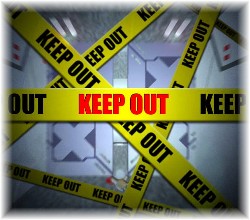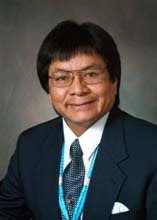January 29, 2009
“You are now entering the New Mexico state Legislature. You have the right to remain silent — even though that’s probably not why your constituents elected you. Anything you say or do on the floor of the House or Senate and in committee meetings can be held against you — and probably will be if you do or say anything idiotic. You have the right to claim that your stupid act or statement was ‘taken out of context’ even if the public has the right not to believe your sniveling.”

If webcasting is going to be allowed in the Roundhouse, I believe our lawmakers deserve to be read their rights, something like the statement above, immediately before the sessions begins.
Quick recap: The Senate voted last year to start webcasting its floor sessions and actually use some of the $75,000 appropriated for that project a few years back. The state spent some $30,000 on webcams and installed them in the Senate chambers. However, late last year, the Senate Committee on Committees voted to scuttle the project, and the cameras were taken down before the session started. The full Senate voted 30-10 this week for the committee to reconsider.

Meanwhile, state Rep. Janice Arnold-Jones, R-Albuquerque — on her own and with her own equipment — started webcasting her committee hearings, evoking the ire of Rep. Ed Sandoval, D-Albuquerque , who chairs the House Taxation and Revenue Committee, which appeared live on the Web on Monday afternoon.
Legislative leaders are dealing with the webcast uprising in traditional ways. The Senate is waiting on a report from the Legislative Council Service about cost and how other state legislatures have been affected by webcasting (only 45 other states do it). The House has referred the matter to a subcommittee.
The upshot: Don’t hold your breath.

Sleep disorder: Indeed, it would appear that the biggest apprehension some lawmakers have about Web cameras following the session is the fear of being caught doing something dumb.
Rep. Ray Begaye, D-Shiprock, said at a House committee meeting this week, “They could use it if I’m sleeping and I’m being recorded. It could be used as a political gain (by) my opponent.”
This might just be the Quote of the Year for this Legislature.
Begaye went on, talking about televised meetings of the Albuquerque City Council: “They catch people almost slurping their coffee or whatever.”
Personally, I’d rather be caught on camera slurping coffee than snoozing.
In fairness, Begaye says he favors webcasting in the Roundhouse.
There’s nothing in state campaign-finance laws that would prevent Begaye or any other sleeping beauty in the Legislature from using campaign contributions to purchase a big supply of No-Doze for legislative sessions.
But it’s not just drowsiness that’s the issue with some legislative Web camera opponents. At a Senate Committee on Committees meeting this week, Sen. Carlos Cisneros, D-Questa — who has voted in favor of the webcams — noted senators sometimes get “exhausted” after lengthy floor sessions and “say the wrong thing.”
If there’s webcasting and that happens, Cisneros said, “You’re on YouTube and there’s nothing you can do.”
Yes, the good old YouTube factor. Legislators would have to learn to refrain from referring to their political opponents as “Macaca.”
And something nobody’s thought of yet: Illegal music downloaders with unauthorized copies of “The Potato Song” as performed by Sen. John Pinto, D-Tohatchi. Someone instruct the Legislative Council Service to contact the Recording Industry Association of America for help in preparing the lawsuits.
Actually, according to the senator who started the webcast push, Sen. Mark Boitano, R-Albuquerque, capturing footage from streaming webcasts won’t be possible. There’s no plans to archive video of the sessions, he said.
Boitano told me Monday that being aware that people out there in Constituent Land are watching would be good for the Legislature. It would encourage lawmakers not to “shoot from the hip” and to choose their words carefully, he said.
Boitano also joked that legislators who have been using their “high school pictures” on campaign literature would have to update them if webcasting becomes a reality.
A circus of secrecy: But is it possible that the resistance to webcasting represents some deeper fear than having late-night gaffes or afternoon naps turned into attack ads?
Maybe, just maybe, some leaders don’t want to shine more light into the Roundhouse. I’ve often said that considering the difficulty with parking in the Capitol area, the tiny committee rooms and the unreliable schedules, it sometimes seems that the Legislature just wants to be left alone.
Indeed, there have been several stories lately about secrecy in state government.

There’s Gov. Bill Richardson’s $1.7 million Moving America Forward Foundation, which refuses to release the names of contributors and expenditures.
There’s Attorney General Gary King’s unexpected opposition to opening conference committees. (Nobody’s even asked yet to webcast conference committees.)
And of course, there’s New Mexico’s campaign-finance reporting requirements, which, unlike many other states and the federal government, don’t even require candidates to list their contributors’ employers.
Webcasting, of course, isn’t the ultimate solution for secrecy in government. But the resistance to it seems like a symptom.




